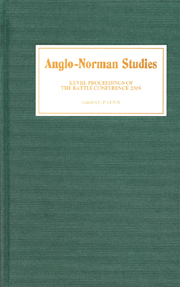Book contents
- Frontmatter
- Contents
- LIST OF ILLUSTRATIONS, MAPS, AND TABLES
- EDITOR'S PREFACE
- ABBREVIATIONS
- Inside the Anglo-Norman Family: Love, Marriage, and the Family (R. Allen Brown Memorial Lecture)
- Land Tenure and Royal Patronage in the Early English Kingdom: A Model and a Case Study
- The Homilies of a Pragmatic Archbishop's Handbook in Context: Cotton Tiberius A. iii
- Robert de Vaux and Roger de Stuteville, Sheriffs of Cumberland and Northumberland, 1170–1185
- The Common Steeple? Church, Liturgy, and Settlement in Early Medieval Lincolnshire
- The Question of Masculinity in William of Malmesbury's Presentation of Wulfstan of Worcester
- Share and Share Alike? Bishops and their Cathedral Chapters: The Domesday Evidence
- Dunstan and Monastic Reform: Tenth-Century Fact or Twelfth-Century Fiction?
- Domesday Now
Robert de Vaux and Roger de Stuteville, Sheriffs of Cumberland and Northumberland, 1170–1185
Published online by Cambridge University Press: 12 September 2012
- Frontmatter
- Contents
- LIST OF ILLUSTRATIONS, MAPS, AND TABLES
- EDITOR'S PREFACE
- ABBREVIATIONS
- Inside the Anglo-Norman Family: Love, Marriage, and the Family (R. Allen Brown Memorial Lecture)
- Land Tenure and Royal Patronage in the Early English Kingdom: A Model and a Case Study
- The Homilies of a Pragmatic Archbishop's Handbook in Context: Cotton Tiberius A. iii
- Robert de Vaux and Roger de Stuteville, Sheriffs of Cumberland and Northumberland, 1170–1185
- The Common Steeple? Church, Liturgy, and Settlement in Early Medieval Lincolnshire
- The Question of Masculinity in William of Malmesbury's Presentation of Wulfstan of Worcester
- Share and Share Alike? Bishops and their Cathedral Chapters: The Domesday Evidence
- Dunstan and Monastic Reform: Tenth-Century Fact or Twelfth-Century Fiction?
- Domesday Now
Summary
The counties of Northumberland and Cumberland, together with their castles, were surrendered to Henry II, king of the English, by Malcolm IV, king of Scots, at Chester in 1157. At the Michaelmas session of the exchequer in 1158, the farms and profits of both counties were accounted for by their sheriffs, those of Northumberland by William de Vescy and those of Cumberland by Robert fitz Truite. William de Vescy's father Eustace fitz John had been killed in the king's service in 1157; William himself was a landholder of substantial wealth in northern England. He continued to serve as sheriff of Northumberland until Easter 1170, when he was replaced in office by Roger de Stuteville, whose tenure is a central subject of this paper. William's removal coincided with the deposition of sheriffs and their bailiffs commanded by the king at a council immediately after Easter 1170. In Cumberland Robert fitz Truite and his son Adam appear to have claimed the shrievalty of Carlisle; Robert's mother, Truite, was the daughter of the Hildred of Carlisle who had accounted for the farm of Carlisle and the king's manors in 1129–30. Robert retained his office and continued to account for Cumberland until Michaelmas 1173, though his son Adam rendered account on his behalf in the year 1172–3. In 1173–4 Adam himself accounted for Cumberland as sheriff in his own right. At Michaelmas 1174 he was removed and replaced by Robert de Vaux, the second subject of this study.
- Type
- Chapter
- Information
- Anglo-Norman Studies 28Proceedings of the Battle Conference 2005, pp. 65 - 102Publisher: Boydell & BrewerPrint publication year: 2006



